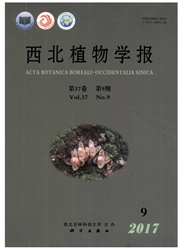

 中文摘要:
中文摘要:
该实验构建了含甘蓝型油菜黄化相关基因BnCr4特异片段反向重复结构的RNA干扰(RNAi)载体pF-GC5941-Cr4,通过根癌农杆菌介导转化油菜,获得47株抗Basta的抗性再生油菜植株,其中10株经PCR鉴定为阳性转基因植株。随机选取3株经鉴定的转基因阳性油菜植株进行半定量RT-PCR分析,结果显示,相对于非转基因的野生型油菜,3株转基因植株中BnCr4基因的表达量分别降低了78.5%、8.5%、11.8%,表明该干扰载体转入油菜能特异引起植株BnCr4基因表达量下降。
 英文摘要:
英文摘要:
BnCr4 was related with chlorophyll reduced seedling mutation. In this study, the plant RNA interference(RNAi) expression vector pFGC5941-Cr4, which contains BnCr4 gene-specific sequence in the sense and antisense orientations,was constructed and transferred into B. napus mediated by Agrobacterium turnefacien. Forty seven regenerated plants resistant to Basra (5.0 mg· L^-1 ) were obtained. Ten transgenic plants were confirmed by PCR. Three transgenic plants were selected for expression analysis. Semi-quantity RT-PCR analysis result showed the expression levels of BnCr4 in the three transgenic plants were down-regulated 78.5%, 8.5% and 11.8% compared with that of wild type, respectively. The results revealed that the pFGC5941-Cr4 vector has been inserted the genome of B. napus and induced the decrease of BnCr4 gene expression.
 同期刊论文项目
同期刊论文项目
 同项目期刊论文
同项目期刊论文
 期刊信息
期刊信息
